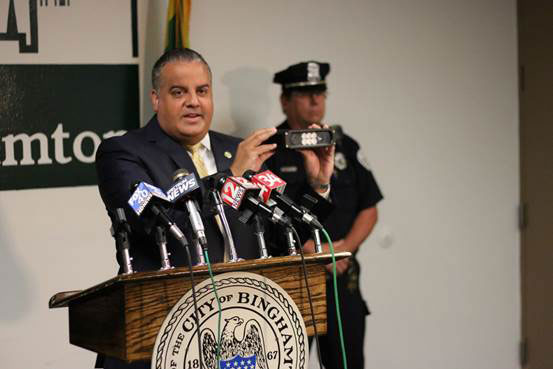
Data from license plates will now be collected when cars enter the limits of the city of Binghamton.
Fifteen stationary license plate readers have been installed at eight separate locations on the city’s perimeter as part of the “Safe City” initiative, according to Binghamton Mayor Rich David at a press conference Monday morning.
The readers will scan, capture and store the license plate information of all vehicles entering the city. The data received will be automatically cross-referenced with local, state and federal law enforcement databases, as well as Department of Motor Vehicles (DMV) records.
“Our police do a great job of catching criminals after crimes occur, but more proactive policing can better prevent big-city crime from encroaching on our neighborhoods,” David said.
According to David, the new technology will make the city safer, as patrol officers will be alerted when criminals are entering the area.
“When license plates are scanned, the LPRs’ alert will sound for things like stolen vehicles, stolen [license] plates, wanted persons, sex offenders or other vehicles of interest in local, state or federal law enforcement investigations,” David said.
The license plate readers take into account unregistered motor vehicles and also provide the police department with alerts regarding people with suspended licenses or registrations. The readers do not issue tickets or add to anyone’s records, and any data received by them is accessible to the public through the DMV.
“The purpose of the LPRs is not for minor traffic violations, rather for stolen vehicles, stolen plates and above,” said Binghamton Police Chief Joseph Zikuski. “When [the alert] goes off in the [patrol] car, it’s going to be for a significant crime.”
Last week, hours after the monitor station became active at the Binghamton Police Department headquarters, the department received its first significant notification regarding a vehicle that had been reported stolen from Tennessee. A nearby patrol car engaged in a pursuit that resulted in the arrest of one of the three men who attempted to flee the scene. The investigation remains ongoing.
“The initiative is not fully operational at this time, but has already had an impact in the city and beyond its borders,” David said. “You cannot put a price tag on preventing individuals and families from becoming victims of a crime.”
The department will follow the policy as issued by the New York State Division of Criminal Justice Services to guide the license plate reader data and retention.
“LPR data will be stored for up to five years, and the department will follow any legislative or court decisions regarding standardized retention rules,” David said.
David also said that he has spoken to many of the mayors and town supervisors in nearby municipalities who have expressed interest in implementing similar programs and sharing data across borders if the initiative proves successful.


